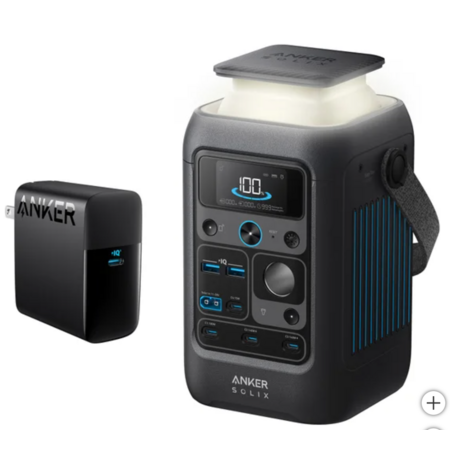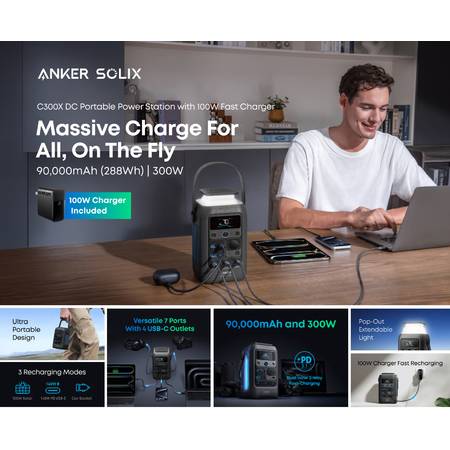Costco Wholesale has for its
Members:
Anker SOLIX C300X 288Wh DC LFP Portable Power Station (SOLIX-28-PS) +
100W Fast Charger on sale for
$159.99.
Shipping is free.
Thanks to Community Member
gooddealforenergy for finding this deal.
Note: Non-Members may purchase but are subject to a 5% surcharge.
Features:- Keep all your essentials charged on the go, while camping, or even for backup power. This power bank station features 300W of total output and seven outlets, including two 140W input/output ports.
- C300X DC features versatile ports for any type of device. Power up with a 120W car socket, two 140W USB-C ports, one 100W USB-C port, one 15W USB-C port, and two 12W USB-A ports.
- Using paired bonus 100W charger, with exclusive ActiveShield safety technology, delivers 100W output, pumps out enough power to charge your C300X DC to 80% in 2.5 hours, so you can stay productive and fuel-up all day.
- Carrying C300X DC by the handle, this travel-friendly power bank station is 30% smaller than other brands for accessible off-grid power.
- Stay powered wherever you are, on adventures or at home. C300X DC has an extendable built-in light for power at night, perfect for camping or outages.
- Connect two 140W USB-C cables (280W total) to recharge to 100% in 1.5 hours. Plug in solar panels or the included bonus 100W charger for a full recharge in less than 3.2 hours.
- Give your devices and C300X DC a quick boost at home, on the road, or in nature. The power bank station's two-way USB-C port delivers 140W to your devices while also recharging itself.
- This power bank station features LFP batteries rated for 3,000 cycles, ultra-durable electronics, temperature monitoring up to 100 times per second, and an impact-resistant structural design.




Leave a Comment
Top Comments
And zero security is fake news. The button on the top left allows you to disable BT and save a little power. Similarly sized Ecoflow units don't have this capability.
I have this and think this form factor is ideal. No AC inverter makes it very efficient to top off electronics. I'll even use it to charge my larger AC powerbanks to give them longer runtime.
30 Comments
Sign up for a Slickdeals account to remove this ad.
Our community has rated this post as helpful. If you agree, why not thank slow_hachiroku
And zero security is fake news. The button on the top left allows you to disable BT and save a little power. Similarly sized Ecoflow units don't have this capability.
I have this and think this form factor is ideal. No AC inverter makes it very efficient to top off electronics. I'll even use it to charge my larger AC powerbanks to give them longer runtime.
Here is a breakdown of the standard rules:
Portable battery packs are always a carry-on item. They are strictly prohibited in checked baggage due to the risk of fire.
General Guidelines
* Up to 100 Wh (Watt-hours): You are generally allowed to bring power banks with a rating of up to 100 Wh in your carry-on luggage without needing special airline approval. Most common consumer power banks, including those for smartphones, tablets, and many laptops, fall into this category.
* 101-160 Wh: For batteries in this range, you typically need to get prior approval from the airline. You are usually limited to carrying a maximum of two spare batteries (including power banks) of this size per person.
* Over 160 Wh: Battery packs exceeding 160 Wh are generally forbidden for air travel on passenger aircraft.
How to Find Your Battery's Watt-Hour (Wh) Rating
The watt-hour rating is usually printed on the battery pack itself. It might be listed as "Wh".
If you can't find the Wh rating, you can calculate it using the following formula:
* Wh = (mAh \times V) / 1000
Where:
* mAh is the milliamp-hour rating (usually prominently displayed on the battery pack).
* V is the nominal voltage (typically 3.7V for most lithium-ion batteries).
For example, a 20,000 mAh power bank with a nominal voltage of 3.7V would be:
* (20,000 mAh \times 3.7V) / 1000 = 74 Wh
This would be well within the 100 Wh limit.
Key Things to Remember
* Protect Terminals: To prevent short circuits, you must protect the battery terminals. This can be done by leaving the battery in its original retail packaging, taping over the exposed terminals, or placing each battery in its own separate plastic bag or protective pouch.
* Airline-Specific Rules: Always check with your specific airline before you fly, as they may have their own additional rules or limitations.
* Damaged Batteries: Damaged, recalled, or leaking batteries are not allowed on planes.
I agree with hachiroku above, when compared to Ecoflow this is better in every way, the features added are just that, added features.
So if you do not like the app support, or the light, or the extra ports don't use them
The really sad thing is my review above, I am going to do a quick take 2 and retest the charging as maybe my Ecoflow was defective, and I sent it back weeks ago and I still have not gotten my replacement, when I could have had one in 2 days from Amazon.
Good job Ecoflow - Oh especially the dishonest part about telling me my replacement already shipped when I inquired weeks after my return. The shipping company sends me later, hours after I asked where my replacement is that you just created the label after the conversation and the product had not been received.
So yeah, I have timestamps on all that communication and will share that with the Take 2 of the updated review for charging testing.
Sign up for a Slickdeals account to remove this ad.
for the price that is really good charging speed and ports and size
its very compact, even smaller than the non dc version, and has crazy fast usb c charging (a single anker 140w usb c charger is like $80)
If i really need AC, i can plug a seperate inverter into the car port on it, but when camping i dont really have any ac needing devices.
basically size and specs and price are very good. i cant find any other device that competes
Sign up for a Slickdeals account to remove this ad.
If i really need AC, i can plug a seperate inverter into the car port on it, but when camping i dont really have any ac needing devices.
basically size and specs and price are very good. i cant find any other device that competes
Temu has the same Inverter for half the price. There are even cheaper and more powerful setups you can do for the same price. The current best is an EcoWorthy bundle that's 5x the capacity with a 1kW pure sinewave inverter for the same price.
The only reason to get this $100+ item is you don't have to do any of this work, it's all done for you and if the unit fails, either Anker or costco will, hopefully help.
Leave a Comment